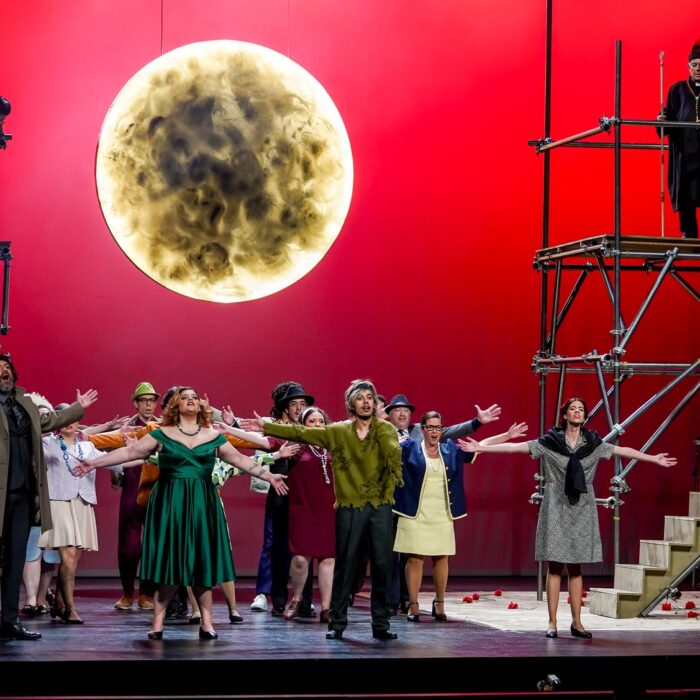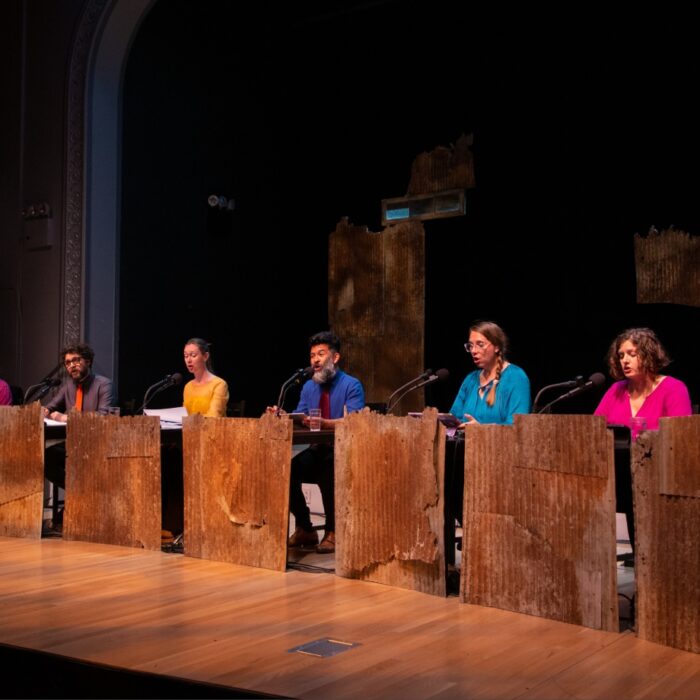
National Sawdust 2024 Review: Emruz Festival’s ‘Whispers of the Flesh’
Inspired by the ‘Woman, Life, Freedom’ Movement in Iran and Around the World
By Jennifer Pyron(Photo credit: Kaveh Kowsari)
National Sawdust presented Emruz Festival’s “Whispers of the Flesh” on Friday, April 26th, 2024, directed by Shadi Ghaheri and assistant director/stage manager Lilia Houshmand, as part of a three performance series of works written by Iranian women residing within Iran. “Whispers of the Flesh” brings to light the works of women facing their own bodies and ultimately their entire culture as a means of cathartic resilience and release. The three plays featured on this opening night included “Quasi-Kangaroo” by Mojgan Khaleghi and performed by Mehry Eslaminia, “On Me and the Body” by Niloofar Nedaei and performed by Yekta Khaghani, and “Turquoise Hemlocks” by Sima Mobarak-Shahi and performed by Shadi Ghaheri. All three plays were translated from Persian by Siavash Saadlou. The curation of these monologues are part of a bigger anthology co-curated by Yekta Khaghani and Diana Fathi.
The live music played throughout this anthology of works is by composer Niloufar Nourbakhsh who is also known for her operas, “We the Innumerable” and “Threshold of Brightness.” Nourbakhsh won the Beth Morrison Projects 2022 Next Generation Competition for “Threshold of Brightness,” directed by Shadi Ghaheri, and continues to expand her awareness and courage through her compositions in collaboration with artists willing to reveal their most intimate selves. “Whispers of the Flesh” embodies hope by illuminating the complex real life experiences of womanhood in Iran.
When the September 2022 death of Jina Mahsa Amini, while in the custody of Iran’s morality police, ignited the “Woman, Life, Freedom” revolution around the world, many artists were drawn to participate in whatever way possible in remembrance and resistance. “Whispers of the Flesh” investigates these subconscious streams in solidarity with this movement and reaches far beyond what could be ever tracked or tortured, creating space for the observance of humanity’s ongoing evolution and the freedom of women.
(***Trigger warning based on stories of sexual abuse and violence)
Quasi-Kangaroo (Moigan Khaleghi)
A young woman describes her difficult coming of age memories in the form of a flowing outcry for release from the emotional weight that binds her in this gut-wrenching drama. Performed by Mehry Eslaminia, this juxtaposed emotional quandary of past, present, and future came to vivid life in a clamorous uproar. Eslaminia began with a detailed recounting of Khaleghi writing a note to her father and strategically engaged with the very logical role of being a young women in an Iranian home. It felt like a vacuum had opened its mouth and swallowed the listeners whole as Eslaminia’s voice depicted what she would do and what she could never be allowed to even dream of doing, suffocating the simple joys and pleasures of a young woman one beating at a time. One may never forget the shiny blackness of Eslaminia’s eyes as she described riding the bus and being molested by her fellow seatmate as she stood up, demanding to pass without enough space to squeeze beyond the tightening grip of yet another heavy handed male. It seemed her eyes would melt into a thousand more stories from this point of no return, where her character kept stumbling as she so desperately yearned to be released from the struggle of her very existence. Her life as a young woman in Iran was articulated beautifully and warmly through Eslaminia. It was hard for me, however, to be merely a by-standing audience member who could do nothing to help her fight against all of her odds. I felt I too was on fire, like a channel of conscious knowing ready to consume the next round of memories as they bubbled up and toppled over what is practically impossible for this character to feel—her own freedom.
“Quasi-Kangaroo” tapped into the heart of where emotional torture must begin: that fleshy place at the core of every human being, pulsing and searching for its escape route. The kangaroo in this story was the escapee, bouncing forth and leaping into its next grand adventure. Only in this story, the character never did escape the actual life she was living. Instead, Khaleghi’s character transforms over the course of her existence and is made whole by the broken pieces that bound her up and fed her what she needed, when she needed it. I loved closing my eyes and tasting the words of this piece in my mouth as Eslaminia tore into the loneliness and vastness of her characters existence. There was a savoring of the text that could not be denied, like a deep fire made holy long enough to break through the silence. “Quasi-Kangaroo” carries the torch of revolution forward and was the perfect opening to “Whispers of the Flesh.”
On Me and the Body (Niloofar Nedaei)
Niloofar Nedaei’s “On Me and the Body” begins with a powerful and violent dream about a young woman being decapitated by her father and mutilated by her mother while sleeping peacefully in her bed. The clear imagery of text in this work was performed brilliantly by Yekta Khaghani. Her voice sounded crisp and aligned to the ground she slammed her body upon and dug her toes into as she was on stage. Khaghani was so captivating to watch and listen to that I noticed the audience sitting immobile, all bolt upright, lost in a trance of lucid discovery. “On Me and the Body” is a mysterious derivative of the violence and unseen mental abuse of women. The text negates unnecessary backwash that can come from the complexities of a family fighting over its very lineage, and instead gets straight to the point. Yekta Khaghani stared into the audience as she used her voice to uncover the ghostly recollections in the bed of someone’s rattled mind. Her dark hair and eyes could be seen, even when the lights went out, as shadows waiting for one to encounter and emotionally encapsulate. Nedaei’s “On Me and the Body” makes one feel the putrid rot of injustice that lingers like a bad smell in the back of the mind, sticky in its wastefulness and ready to be purged from its festering surroundings.
Turquoise Hemlocks (Sima Mobarak-Shahi)
The closing performance was performed by Shadi Ghaheri. This might have been the most physically demanding work of the anthology. A young woman describes to the authorities why she stood on top of an electrical box and waved her hijab in the middle of the day while her daughter slept alone at home. Shadi Ghaheri performed in place of Sima Mobarak-Shahi, who was unable to make it to the performance due to a distressing visa situation. Fortunately, Ghaheri was spot on in her depiction of Mobarak-Shahi’s text. Her voice alternated between roles with ease and wisdom. She worked her physicality into this piece, accenting the contortions and anxiety-driven fight or flight mechanisms of an Iranian woman. I loved how pure and innocent Ghaheri’s voice was in contrast to the harsh reality of her role, digging into the confines of her male oppressor’s forceful questioning.
Musical Highlights
Three pieces of music were performed as interludes, composed by Niloufar Nourbakhsh with vocals by Mehry Eslaminia and a small ensemble. “Seeking You” is written for voice and piano as a dream web intertwining the nuanced vocals of the storyteller with a poem by Iqbal Lahori and Táhirih Qurrat al-ʿAyn edited and translated by Amin Banani with Jascha Kessler. This piece was simple yet very effective. “Lalaie” is written for vocals and electronics. It quietly grows into a wave of nostalgic vocal hums highlighted by Nourbakhsh’s wonderful imagination of sound. “Dawn” features a poem by Forugh Farrokhzad, excerpted from “Let us believe in the dawn of a cold season” (the translation taken from “Sin: Selected Poems of Forugh Farrokhzad” as edited and translated by Sholeh Wolpé).
Composer Niloufar Nourbakhsh and the Emruz Festival 2024’s “Whispers of the Flesh” informs the mind through the difficult means of the body, transcending music and text in solidarity with “Woman, Life, Freedom” to be felt for generations to come.



